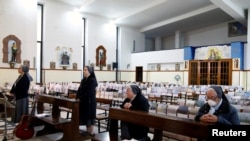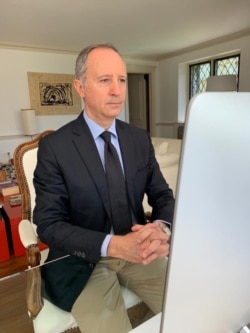Amid their anxiety and mourning for friends and family in their virus-stricken homeland, the diplomats at Italy’s embassy in Washington are working earnestly to secure help from afar.
“We are all concerned by the situation in Italy. Our thoughts are constantly with relatives and friends, some of whom live in the hardest-hit areas of the country,” said Ambassador Armando Varricchio, who answered questions by email in accordance with the new social distancing norms.
Italy was the first European country to see a large spike in cases of COVID-19, the disease caused by the coronavirus, and remains among the most severely affected, with more than 143,000 cases confirmed and more than 18,000 deaths as of Thursday afternoon, according to Johns Hopkins University's Coronavirus Resource Center.
Varricchio, whose staff is working long hours to address the needs and concerns of Italian citizens in the United States, told VOA his country was deeply grateful for $100 million worth of aid recently announced by President Donald Trump. He described the assistance as “a testament to a deeply rooted friendship that unites us.”
Trump announced the aid, which he said would consist of “surgical and medical and hospital things,” at a White House event on March 30, adding that the people of Italy “are having a very hard time.”
The U.S. business community has also stepped up with donations totaling more than 25 million euros, the ambassador said, “and we have also seen great support coming from nonprofit organizations.”
Beyond that, Varricchio and his colleagues have teamed up with an organization comprising North America-based Italian scholars and scientists to raise money on GoFundMe for a research institute in Rome that focuses on infectious diseases, as well as hospitals in Milan and Naples.
Despite the urgency of the situation, Varricchio is already looking ahead to what can be done to help his country emerge from the crisis.
“What will be most needed in the long run,” Varricchio said, “is rebuilding our society, our economy and achieving robust growth.” He identified transatlantic trade, along with ties in economic activities and in finance, as “crucial.”









